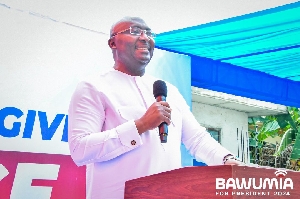- Home - News
- TWI News | TV
- Polls
- Year In Review
- News Archive
- Crime & Punishment
- Politics
- Regional
- Editorial
- Health
- Ghanaians Abroad
- Tabloid
- Africa
- Religion
- Election 2020
- Coronavirus
- News Videos | TV
- Photo Archives
- News Headlines
- Press Release
Opinions of Tuesday, 23 November 2010
Columnist: Djan, Emmanuel Opare
Health insurance after 2012
MORE FUNDING NEEDED
To support over 7 million under 18, over one million pregnant women, the aged and indigents who form over 70% beneficiaries but contribute nothing to the scheme
Source: Emmanuel Opare Djan
Daily Democrat
Information available to the Daily Democrat indicates that, the financial projection for the national health insurance scheme beyond the year 2012 is frightening, raises concern about the guarantee of quality health care delivery to the people. It is estimated that capital inflows to run the scheme after 2012 will be inadequate to fulfil its obligation to service providers’ claims.
According to the source, if innovative and pragmatic effort is not institute now to improve the financial inflows to run the scheme in future, it will impact negatively on the scheme likely to suffer collapse.
The funding pattern for the scheme has remained the same since 2005 when it starts even though inflation cost of drug and medical services have gone up .It was also revealed that utilization has shot up from 1.3 million people in 2005 to about 16million in 2010 due to peoples’ confidence in the scheme. It important therefore to advocate for extra funding to help sustain the scheme to offer better and quality service to Ghanaians, the source added.
Maintaining the financial status quao will not help the scheme to play its role as a social protection programme creating a lot of burden for children, pregnant women, the aged and indigents who need financial support to access health care.
It is worth mentioning that over 70% of beneficiaries ‘parasites’ the scheme by accessing the scheme free. These are about 49% of the country’s under 18 teeming youth, 1.3 million pregnant women added to the scheme by for president Kufour in 2007, the aged(over 70 years),pensioners and people who have no livelihood(indigents). These categories of people are the vulnerable and need frequent health care.
The programme source of funding since inception has been funded through, 2.5% vat contribution called National Health Insurance Levy (NHIL) representing 61% of total funding, 2%social security and National Trust,15% of funding, returns on investments 17% of funding, premium payment, 3.8% of funding and others 3.2% .
It is time all stake holders reach a consensus about the best way to fund the programme to avoid the scheme’s collapse to save millions of Ghanaians whose hope of better health care is the National Insurance Scheme.
Health insurance across the globe plays a vital role in health care delivery. It is a social intervention policy that guarantees citizenry of a better health care with improved health facilities and health care professionals .The National health insurance scheme operating by the National Health Insurance Authority was enacted by parliament in 2003 and started operations in 2005 with less than one million three hundred thousand (1,300,000) subscribers but has steadily progress to about sixteen million (16,000,000) subscribers today because of subscribers’ confidence in the scheme.
The scheme has help to address health needs of millions of Ghanaians who could not have had access to medical attention due to financial constraints. It is describe as the saviour of the less privilege in society.
It is estimated that about 49% of beneficiary are under 18 who pay nothing, plus over one million pregnant women, the aged who are over 70 years and the indigent are exempted from premium payment and therefore access the scheme free of charge .
A critical look at the resource mix reveals that the VAT levy is the single highest resource contributor, which accounts for over 60% of funding to the scheme and therefore the surest way to rope in more funding if the rate is increased to 3% or 3.5% to be able to address the projected deficit from 2012.
The scheme has over 5,000 service providers who are accredited to provide healthcare services to NHIS CARD bearers across the country.
The collapse of there will not only affect subscribers but these businesses and the entire economy. The decision to sustain this laudable social intervention is a collective responsibility of all Ghanaians, let us build a future of hope for the future generation now.










